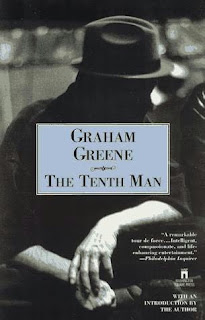The Tenth Man
 Graham Greene's The Power and the Glory is #47 on my 100 Great Books list. I'm quite excited to read it now, because this week I came across a copy of The Tenth Man, a novella with an unusual history: Greene originally came up with the idea as a treatment for an MGM project before the war, and had the opportunity to novelize it many years later.A rich lawyer, Chavel, is imprisoned by the Nazis along with twenty-nine other Frenchmen. They're told that one in ten of them must die the next morning, so they draw lots. The rich lawyer is chosen, but offers his home and fortune to any man who will take his place. A sullen young clerk (who's probably dying of TB anyway), Michel Mangeot (called Janvier), takes Chavel up on his hysterical offer so that his mother and sister can live comfortably. Janvier is executed along with the other two men, and when Chavel is eventually released, he returns to the dead man's childhood home because he has nowhere else to go. Janvier's twin sister Thérèse offers him a job, and naturally he takes it. (Thérèse tells Chavel, who is now calling himself Charlot, that she will spit in Chavel's face if he ever returns. She's expecting him any day, so how can she not realize he's the very man she's confiding in? Even when she remarks on his familiar handwriting! But that's my only quibble.)The Tenth Man is the first Graham Greene I've read, and I love it--spare but incisive. I don't mind bleak stories so long as there's a point to the bleakness, and this story is beautifully so.
Graham Greene's The Power and the Glory is #47 on my 100 Great Books list. I'm quite excited to read it now, because this week I came across a copy of The Tenth Man, a novella with an unusual history: Greene originally came up with the idea as a treatment for an MGM project before the war, and had the opportunity to novelize it many years later.A rich lawyer, Chavel, is imprisoned by the Nazis along with twenty-nine other Frenchmen. They're told that one in ten of them must die the next morning, so they draw lots. The rich lawyer is chosen, but offers his home and fortune to any man who will take his place. A sullen young clerk (who's probably dying of TB anyway), Michel Mangeot (called Janvier), takes Chavel up on his hysterical offer so that his mother and sister can live comfortably. Janvier is executed along with the other two men, and when Chavel is eventually released, he returns to the dead man's childhood home because he has nowhere else to go. Janvier's twin sister Thérèse offers him a job, and naturally he takes it. (Thérèse tells Chavel, who is now calling himself Charlot, that she will spit in Chavel's face if he ever returns. She's expecting him any day, so how can she not realize he's the very man she's confiding in? Even when she remarks on his familiar handwriting! But that's my only quibble.)The Tenth Man is the first Graham Greene I've read, and I love it--spare but incisive. I don't mind bleak stories so long as there's a point to the bleakness, and this story is beautifully so.
The darkness had long enclosed them both and now the last light slid off the ceiling of the cell. Men automatically turned to sleep. Pillows like children were shaken and slapped and embraced. Philosophers say that past, present, and future exist simultaneously, and certainly in this heavy darkness many pasts came to life: a lorry drove up the Boulevard Montparnasse, a girl held out her mouth to be kissed, and a town council elected a mayor; and in the minds of three men the future stood as inalterably as birth--fifty yards of cinder track and a brick wall chipped and pitted.
And look how he pegs Janvier's mother:
She was like an old weatherworn emblem of wisdom--something you find in desert places, like the Sphinx--and yet inside her was that enormous vacancy of ignorance which cast a doubt on all her wisdom.
This line impressed me as well, but for a different reason: When you reach a certain age you don't care about the future: it is success enough to be alive; every morning you wake with triumph. Greene may have come up with the original idea for The Tenth Man in the late '30s, but he was eighty years old by the time he was writing this novella.I'll leave you with one more gem:
She said, "You can't tell me he was unlucky. It's as you say. That thing happens to everyone once. All one's life one has to think: Today it may happen." It was obvious that she had brooded and brooded on this subject, and now at last she brought out the result aloud for anyone's hearing. "When it happens you know what you've been all your life."